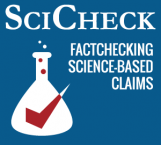Posts Falsely Push Bill Gates-Connected ‘Air’ Vaccine Conspiracy
SciCheck Digest
Inhalable or spray versions of mRNA COVID-19 vaccines are still in development and don’t have regulatory approval. Posts online are distorting recent research from Yale University to falsely claim that governments have approved such products to mass vaccinate people without their consent in a plot involving Bill Gates.
Full Story
Some scientists are working on creating inhalable or nasal spray mRNA vaccines against COVID-19. Such vaccines have the potential to better prevent infection or transmission of the virus than more typical vaccines that are injected. These vaccines, once authorized or approved, would be taken just like any other vaccine, with a person choosing to be vaccinated.
But posts online are falsely claiming that Bill Gates is behind an effort to use inhalable mRNA COVID-19 vaccines to blanket the air and forcibly vaccinate large numbers of people without their consent.

“Bill Gates mRNA ‘Air Vaccine’ Approved for Use Against Non-Consenting Humans,” reads one false headline from the People’s Voice, a dubious website we’ve fact-checked in the past.
“The air vaccine will ‘indiscriminately’ force jab the entire planet with mRNA, delivering the toxic chemicals straight into a person’s lungs,” the post continues.
As we have explained before, the mRNA COVID-19 vaccines have a good safety profile and aren’t “toxic.”
The article proceeds to weave together a few true things — including the existence of some basic research at Yale University on an mRNA nasal vaccine in mice — to falsely suggest a Bill Gates-backed conspiracy is about to begin.
The Bill & Melinda Gates Foundation told us in an email that the claims in the article were “false.”
Other posts have highlighted the same research to suggest the possibility of forced vaccination, sometimes without invoking Bill Gates.
In reality, no mRNA versions of an inhalable COVID-19 vaccine have been approved in any country, according to our research, although some non-mRNA designs have been rolled out in places such as China. And scientists say it’s not possible to spray such a vaccine into the air and vaccinate people unwittingly.
“It is not possible to do that and achieve vaccination, and it is not what we tested in our studies,” W. Mark Saltzman, a biomedical engineer and one of the scientists leading the work at Yale, told us in an email.
The posts also sometimes cite a bioethics paper entitled “Compulsory moral bioenhancement should be covert” to argue that the conspiracy is more plausible. But the paper, which was written by a single academic, is specifically about moral bioenhancement, which the author defines as “the potential practice of influencing a person’s moral behavior by way of biological intervention upon their moral attitudes, motivations, or dispositions.”
This is a theoretical concept, as currently there is no biological way to modify a person’s moral behavior. Moreover, the article is only arguing a conditional — that if moral bioenhancement is compulsory, then it should be covertly administered. It is not directly relevant to COVID-19 vaccination.
The post “cuts up different pieces of information and pieces it together into a Frankenstein theory,” Dr. Angela K. Shen, a vaccine and public health expert at the University of Pennsylvania’s Leonard David Institute of Health Economics, told us. “But it doesn’t really work that way.”
Misinterpreted Yale Study
As supposed evidence of the plot, the People’s Voice article cites an August study published in Science Translational Medicine by researchers at Yale University. “A team from Yale University developed the method for delivering the dangerous chemicals into people’s lungs,” the post incorrectly claims.
But the study, which was performed in mice, is only evidence that scientists are working on developing an mRNA nasal vaccine.
“This basic science study found that mRNA molecules delivered intranasally to the lungs of research animals can be used to effectively vaccinate against the COVID virus,” Saltzman said.
“Contrary to reports on social media,” Saltzman said, spraying the vaccine in the air to mass vaccinate non-consenting people “would not work in humans and this study did not involve humans. Humans must receive a controlled dose that is administered directly into the nose.”
Shen also noted that “when something goes airborne, it dilutes things,” making the prospect of trying to forcibly vaccinate a population by spraying a vaccine highly implausible.

The Yale paper’s main innovation is the polymer nanoparticles used to deliver the mRNA into the lung. Alone, mRNA is very unstable, and won’t get past layers of mucus inside the body or into cells and do anything. At the same time, previous delivery systems scientists have tested have caused lung inflammation.
This design appeared to balance those concerns, at least in mice. But more testing is needed, including in humans, before the vaccine, if successful, would ever become available. Shen, who is also a retired captain in the U.S. Public Health Service, estimated it would take closer to eight to 10 years for such a vaccine to get to market.
Saltzman added that there was “no funding from Bill Gates or his foundation,” consistent with the funding sources listed in his study.
The only connection to Bill Gates we were able to find is a general interest in nasal spray vaccines, which generally are not mRNA-based. The Bill & Melinda Gates Foundation has helped fund other research into nasal vaccines and participated in a virtual workshop about such vaccines for COVID-19 in November 2022, for example.
But as we said, the foundation called the allegations in the posts false, and as we’ll explain in more detail below, there are good public health reasons to want to invest in nasal vaccines. This interest is not evidence of a conspiracy to forcibly vaccinate anyone.
Promise of Nasal Spray Vaccines
Scientists are interested in nasal spray and other so-called mucosal vaccines primarily because by targeting the mucosal tissues where respiratory infections first take hold, they might better prevent infection than injected vaccines.
As pointed out in a summary of the November 2022 workshop on mucosal vaccines for COVID-19, even if such vaccines aren’t able to prevent infection entirely, they may still reduce viral shedding more than injected vaccines, which would reduce transmission of the virus. This, in turn, would more effectively limit surges of disease, lower the number of people who develop long COVID and reduce the risk of creating new COVID-19 variants.
Another advantage of mucosal vaccines is that they are easier to administer. This is helpful to everyone, but could be especially valuable in poorer parts of the world.
“A needleless delivery device is a better delivery method for lower and middle income countries,” Shen told us from Sierra Leone, where she is doing some work.
Since many people are afraid of needles, a needle-free vaccine is also likely to appeal to many people who would like to be vaccinated, but can’t get over their fear.
Relatively few mucosal vaccines exist, however, especially for respiratory illnesses. There is only one Food and Drug Administration-approved nasal spray vaccine. That vaccine, FluMist, uses weakened flu viruses to protect against seasonal influenza.
There are no inhalable or nasal spray COVID-19 vaccines authorized or approved in the U.S. The government, however, is putting money behind at least two designs, neither of which use mRNA — again, with the hope that these easier-to-administer vaccines would also better reduce spread of the coronavirus.
Outside the U.S., there are a few non-mRNA designs from India, China, Russia and Iran with authorizations or approvals.
China authorized the world’s first inhalable COVID-19 vaccine for emergency use in September 2022. It is an aerosolized version of the company’s injectable vaccine, which uses an adenovirus — not mRNA — to deliver instructions for making the coronavirus’ spike protein. The inhalable vaccine uses an individual cup dispenser to transform the vaccine liquid into a mist that can be breathed in.
Sources
Knisely, Jane M. et al. “Mucosal vaccines for SARS-CoV-2: scientific gaps and opportunities—workshop report.” npj Vaccines. 12 Apr 2023.
Jaramillo, Catalina. “COVID-19 Vaccine-Generated Spike Protein is Safe, Contrary to Viral Claims.” FactCheck.org. 1 Jul 2021.
Saltzman, W. Mark. Professor of Biomedical Engineering, Yale University. Emails to FactCheck.org. 10 and 13 Oct 2023.
Crutchfield, Parker. “Compulsory moral bioenhancement should be covert.” Bioethics. 29 Aug 2018.
Shen, Angela K. Senior Fellow, Leonard David Institute of Health Economics at the University of Pennsylvania. Phone interview with FactCheck.org. 9 Oct 2023.
Suberi, Alexandra et al. “Polymer nanoparticles deliver mRNA to the lung for mucosal vaccination.” Science Translational Medicine. 16 Aug 2023.
“An mRNA COVID vaccine (and potentially more) with nanoparticles, no shot needed.” Press release. School of Engineering & Applied Science, Yale University. 16 Aug 2023.
Storti, Olivia White. “Yale researchers develop nasal spray mRNA vaccine for COVID-19.” Yale Daily News. 8 Sep 2023.
Ndeupen, Sonia. “The mRNA-LNP platform’s lipid nanoparticle component used in preclinical vaccine studies is highly inflammatory.” iScience. 20 Nov 2021.
Hartwell, Brittany L. “Intranasal vaccination with lipid-conjugated immunogens promotes antigen transmucosal uptake to drive mucosal and systemic immunity.” Science Translational Medicine. 20 Jul 2022.
“Baltimore Researchers Receive $40 Million from the Bill & Melinda Gates Foundation.” Press release. Bill & Melinda Gates Foundation. 28 Aug 2000.
Topol, Eric J. and Akiko Iwasaki. “Operation Nasal Vaccine—Lightning speed to counter COVID-19.” Science Immunology. 21 Jul 2022.
“Project NextGen Selects Initial Vaccine Candidates and Awards Over $500 Million to Advance Development of Vaccines and Therapeutics.” Press release. HHS. 13 Oct 2023.
“Project NextGen: Next Generation Medical Countermeasures.” BARDA. Accessed 13 Oct 2023.
Waltz, Emily. “China and India approve nasal COVID vaccines — are they a game changer?” Nature. 7 Sep 2022.
McCarthy, Simone and Brenda Goodman. “China approves world’s first inhaled Covid vaccine for emergency use.” CNN. 7 Sep 2022.
“World-First Inhaled COVID-19 Vaccine, Developed in Partnership Between Aerogen® and CanSinoBIO, First Public Booster Immunization in China.” Press release. Aerogen and CanSinoBIO. 14 Nov 2022.
“CanSinoBIO’s Convidecia Air™ Receives Approval in China.” Press release. CanSinoBio. Sep 2022.
This article has been archived for your research. The original version from FactCheck.org can be found here.


